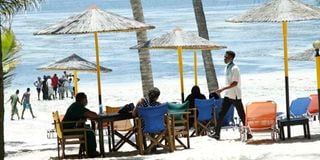Hospitality industry needs peaceful polls

Guests at the Mombasa Continental Resort Beach front in this photo taken on October 22, 2021. Looking at the post-Covid stint, the hospitality industry recovery is on an impressive trajectory.
What you need to know:
- Looking at the post-Covid stint, the hospitality industry recovery is on an impressive trajectory.
- Poorly-managed electioneering and post-election processes could negate the gains.
Hospitality businesses are fragile and largely influenced by political, economic, social, technological, environmental and legal dynamics.
Kenya is in a hotly-contested electioneering season.
According to Julia Faria, a research expert covering Kenya, Angola and Tanzania, travel and tourism contributed $5.4 billion to Kenya's Gross Domestic Product (GDP) in 2021.
This is about five per cent of the GDP. She further opines that the amount increased by nearly 35 per cent compared to 2020 when the tourism industry struggled with the Covid-19 pandemic.
Hospitality industry players are banking on an orderly political transition.
Looking at the post-Covid stint, the hospitality industry recovery is on an impressive trajectory.
Poorly-managed electioneering and post-election processes could negate the gains.
Political activities oftentimes turn dramatic and chaotic.
The fear, anxiety and panic cause a sharp decline in the number of international tourists.
During this period, the tourism industry depends on domestic tourists. Yet the local market movement is limited and inhibited.
Due to the fear of post-election unrest/looting and forceful removal of persons, hospitality investment projects (new hotels, airlines, tour firms, acquisitions, mergers) are shelved.
This is a blow to an industry that has great potential.
This has an adverse effect on the potential job creation and business opportunities.
The cost of goods is every business' concern.
Commodity prices
During electioneering, commodity prices go up because a majority of hospitality suppliers shift focus to political merchandise and activities.
The few left tend to increase commodity prices. This leads to the rolling out of cost-cutting measures.
Organisations avoid making decisions amid an uncertain political environment.
A majority of institutions put off their meetings calendar. They put on hold seminars and symposiums.
Meetings, incentives, conferences and exhibitions (MICE) are the heart of the hospitality industry.
Commerce thrives in a conducive environment. The fact that peace is paramount for any business to grow cannot be gainsaid.
Hospitality stakeholders are yearning for a peaceful election and transition.
An amicable political dispensation will increase investor confidence and increase tourist numbers.
The political players (politicians and citizenry) have a responsibility to conduct themselves in a civil manner before, during and after the elections.
Optimism is high amongst hospitality industry players and the political process will be favourable.
An industry that accounts for 1.1 million jobs and nine million jobs directly and indirectly respectively has every reason to remain on the edge during a hotly contested political season.
Charles Muchangi Wambogo, Nakuru




